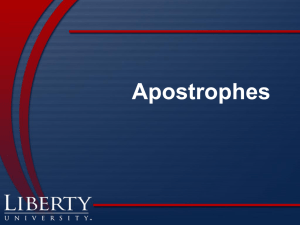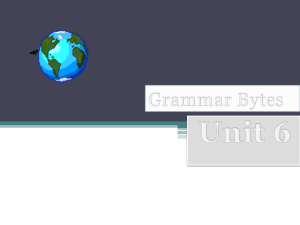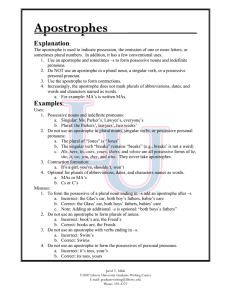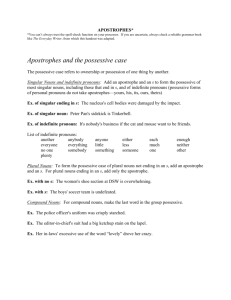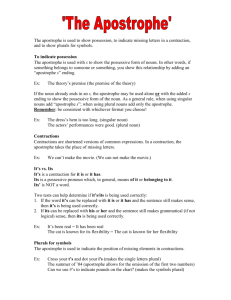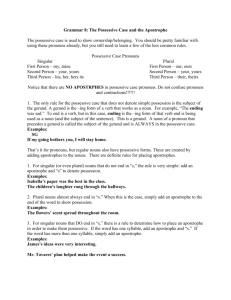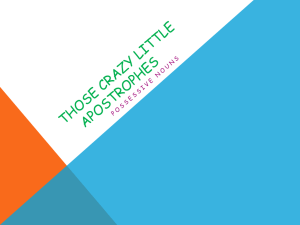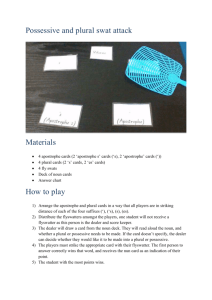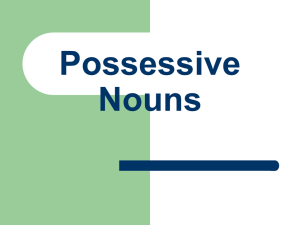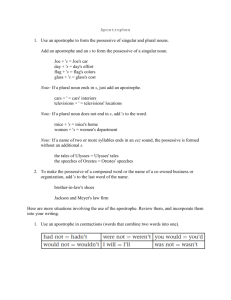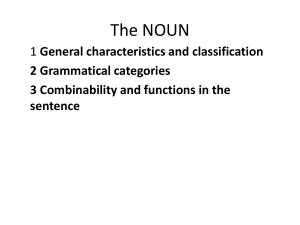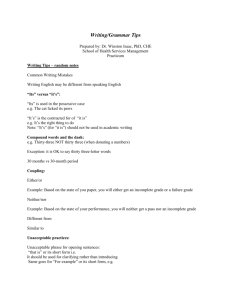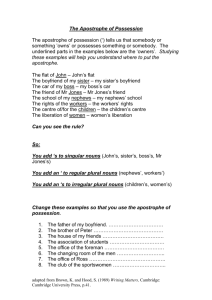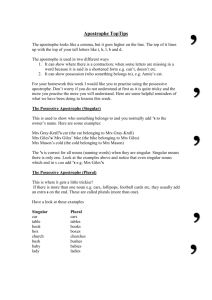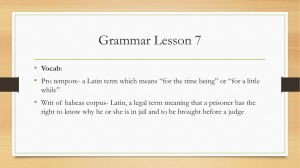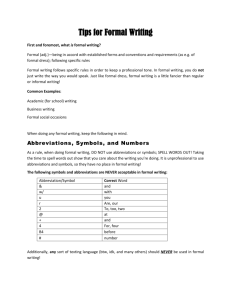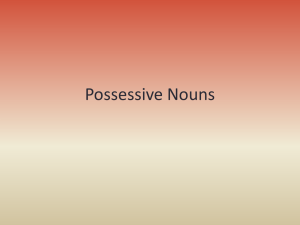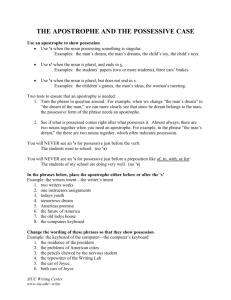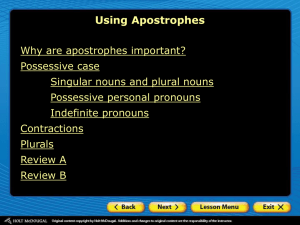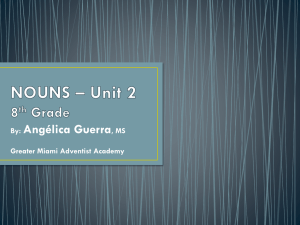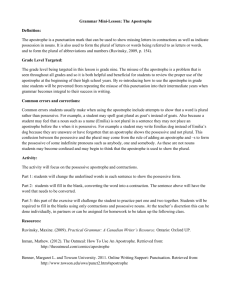Apostrophes 2
advertisement
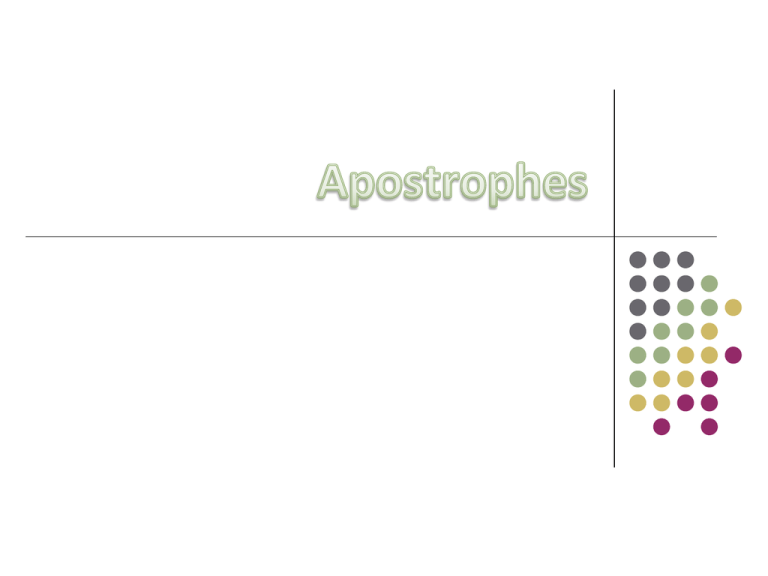
The apostrophe is used to indicate possession, the omission of one or more letters, or sometimes plural numbers. In addition, it has a few conventional uses. Use an apostrophe and sometimes –s to form possessive nouns and indefinite pronouns. Do NOT use an apostrophe in a plural noun, a singular verb, or a possessive personal pronoun. Use the apostrophe to form contractions. Increasingly, the apostrophe does not mark plurals of abbreviations, dates, and words and characters named as words. For example: MA’s is written MAs. 1. Possessive nouns and indefinite pronouns: a) Singular: Ms. Parker’s, Lawyer’s, everyone’s b) Plural: the Parkers’, lawyers’, two weeks’ c) Add –’s if the noun does not end in –s, or if the noun is singular and ends in -s Example: The musician’s guitar was lost; Lois’s car was stolen. d) Add only –’ if the plural form of a noun ends in –s Example: The students’ activities had to be rescheduled. • Incorrect: the Glas’s car, both boy’s fathers, babie’s care • Correct: the Glass’ car, both boys’ fathers, babies’ care • Note: Adding an additional –s is optional: “both boys’s fathers” 1. Possessive nouns and indefinite pronouns (cont.): … e) Add –’s (or –s’) only to the last noun to show joint possession; however if you need to indicate individual possession add –’s to all nouns. Example: Maria and Joseph’s new car is blue; Maria’s and Joseph’s expectations were quite different. f) Add –’s (or –s’) to the last element in a compound word. Example: Her sister-in-law’s surgery was successful. g) Add –’s to indefinite pronouns that are possessive. Example: Everyone’s medical insurance plan was reviewed. 2. 3. Contraction formation: a) The apostrophe is used to replace missing letters in a contraction. Example: It’s a shame that Johnny can’t make it to the concert tonight. It’s stands for it is; can’t stands for cannot. b) It’s a girl, you’re, shouldn’t, won’t Optional for plurals of abbreviations, dates, and characters names as words. a) MAs or MA’s b) Cs or C’s c) Class of ’99 1. 2. Do not use an apostrophe in plural nouns, singular verbs, or possessive personal pronouns: a) The plural of “Jones” is “Jones” b) The singular verb “breaks” remains “breaks” (e.g., breaks’ is not a word) c) His, hers, its, ours, yours, theirs, and whose are all possessive forms of he, she, it, we, you, they, and who. They never take apostrophes. Do not use an apostrophe to form plurals of nouns. a. Incorrect: book’s are, the Freed’s b. Correct: books are, the Freeds 3. 4. Do not use an apostrophe with verbs ending in –s. a. Incorrect: Swim’s b. Correct: Swims Do not use an apostrophe to form the possessives of personal pronouns. a. Incorrect: it’s toes, your’s b. Correct: its toes, yours Plurals Workers’ Moses’ The business’ Possessives The dog’s hair Everyone’s hope Billy’s skill Contractions It is—It’s They are—They’re You are—You’re Who is—Who’s Who has—Who’s 1. 2. 3. 4. 5. 6. 7. Four attorneys’ expertise provided a solid defense for the defendant. There are four s’ and two p’s in the word Mississippi. Their two son-in-laws’ dealership was in financial difficulty. Both Jason and Jeremy’s fathers coached the softball team. Smith and Johnson’s product is selling at a high profit. The senator-elect’s office was staffed primarily by volunteers. Both diplomats’ briefcases were stolen. The children’s noses were pressed against the candy store window. 9. Mrs. Jones’ sister spent last year in Italy. 10. Most of the lawyers’ offices are located on the tenth floor of the building. 11. Several MDs came together to open the clinic in the downtown area. 12. Several companies’ balance sheets showed a deficit balance. 8.
